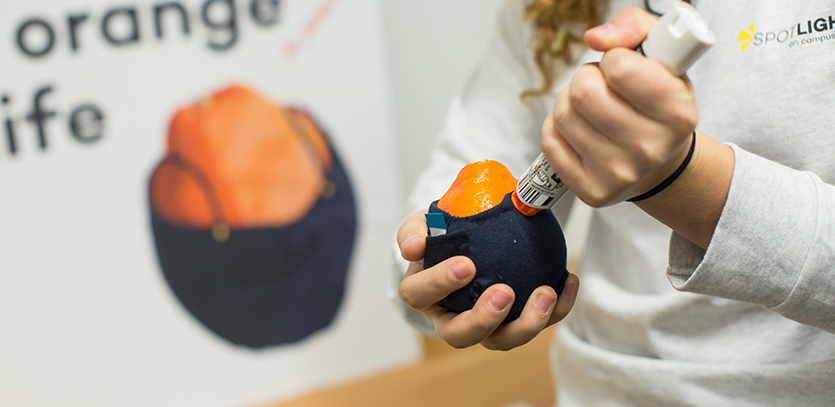Helping Students with Food Allergies Transition to College
Engineering Design Innovation students design services and products for new college students with food allergies.
Starting college is an exciting time. An incoming first-year student will meet their roommate, join campus organizations, and start a whole new chapter with more independence than they may have ever had before.
It can also be an overwhelming time, especially for students with life-threatening food allergies. These students must navigate food choices at a dining hall, during meetings for campus organizations, and at social gatherings without their parents’ assistance, possibly for the first time in their lives.
During the winter quarter, eighteen Engineering Design Innovation (EDI) graduate students tackled these concerns during a 10-week course called Human-Centered Service Design Studio. For the second year in a row, students in the EDI program collaborated with Dr. Ruchi Gupta, a Northwestern-based food allergy researcher, to address the vulnerability of students with life-threatening food allergies on college campuses. The current EDI students built upon the discoveries made by the previous EDI class.
“[Last year’s team] found that orientation was the largest opportunity in allowing students with allergies to become comfortable in the college experience,” said Phoebe Sexton, a current EDI student. “It really sets them up for success in their college career.”
This year, the EDI students narrowed the focus to the pre-orientation and orientation experience.
"We're focused on allergy awareness on college campus, especially as students come in, like picking your roommate and housing selection and moving into your dorm,” said Ryan Callaghan, a current EDI student.
Because the transition to college is so complex, the EDI students looked for ways to improve the student experience through design.
“A lot of students don’t even realize that there be might something that they’re going to need when they leave [home],” explained Alexander (Sasha) Mitts, a current EDI student. “That’s a big conceptual step that not every 17 or 18-year-old has taken already.”
The EDI students broke into five teams and applied the design innovation process to create solutions in the form of a product, interaction, or service. Their process included collaboration, rapid iteration, prototyping, and in-context user observation.
“We talked to different stakeholders, both students with food allergies, people in high school who are planning to go through this process, people in college, and people who work at the college,” said Mitts.
On March 13, the teams presented their solutions to assist students with food allergies to an audience that included Dr. Gupta and parents of children with food allergies:
- Spotlight: Compass: a digital tool to help plan and realize a customized journey for each incoming student with food allergies. It also allows for students to share their journey with parents and physicians.
- Spotlight: Cares: a “college starter package” with information and recommendations for students with allergies as well as a care package with special snacks, a trainer EpiPen, labels for food, and educational infographics for roommates.
- Spotlight: Captivates: peer-to-peer education for scenarios of anaphylaxis utilizing a trainer EpiPen, an easy-to-remember acronym, and a playful artifact.
- Spotlight: Connect: training sessions and allergy-safe catering advice for student organizations so that their events are safe and inclusive for students with food allergies.
- Spotlight: Confidence: a zero contact dispensing method for salad bar ingredients to prevent cross-contamination and create confidence among students with food allergies at dining hall.
"We're designing to remove the burden from the student with food allergies,” explained Erica Isaacs, a current EDI student and part of the Spotlight: Captivates team. “Currently, when a student with food allergies comes to a university, they have to educate all of their peers and that causes anxiety. We can remove that by educating the community as a whole."
Dr. Gupta praised the EDI students’ contributions.
“What you bring with your background in design and our knowledge in terms of the medical aspect of the disease, there is really so much we can do with that,” Dr. Gupta told the class.








